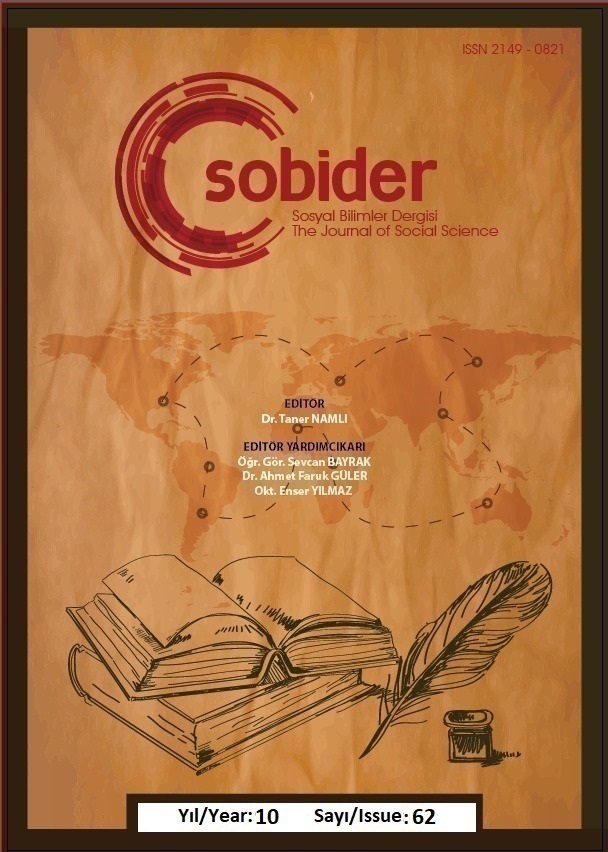Author :
Abstract
Mekân; topluma, toplumsal deneyim ve bireylerarası paylaşım gibi sosyal etkileşime ilişkin durumlara yönelik bir yaşam ya da yaşantı izi taşıyan sosyolojik yapıdır. Mekânın özelinde ev, toplumla birey arasında önemli bir köprü, sosyalizasyonun ve topluma ait normların yerleşmesinde dikkate değer bir bağdır. Ev, beşeri ihtiyaçların tesis edilmesinde önemli mahrem bir mekân, tarihsel süreçlerin geçişinde hem güvenli hem de döneme ait yeniliklerin içselleştirildiği bir alandır. Bu bakımdan zaman yolculuğunda ev, geçirdiği sosyo-mekânsal dönüşüm üzerinden bulunduğu çağa ve çağın değerlerine katkı sağlamaya devam eder. Sanayileşme, kentleşme, modernizm ve dijitalleşme gibi olgularla şekillenen ev, öte yandan çağa uygun kültürel değerlerin taşınmasına yön veren çekirdek kurum ailenin biricik yaşam alanıdır. Dijitalleşme ile birlikte ev, teknolojinin de yardımıyla çok yönlü bir mekân, özel alan ve kamusal alana ilişkin faaliyetleri içinde barındırarak bireye hem toplumsallaşma hem de toplumdan kendini yalıtabilme imkânı sunan bir yerdir. Evin tüm özellikleri ve dijital çağdaki yeri, onu özel alan ve kamusal alana ilişkin unsurları bir araya getirebilen ve bu temel zıtlığı besleyebilecek konuma sahiplik edecek türde bir kaynaştırma mekânı kılmaktadır. Bu kapsamda çalışmanın amacı; evin, zamansal çizelgedeki dönüşümü üzerinden topluma ilişkin kabullerin ve pratiklerin evrilişine rehberlik ettiğini, bu sebeple de bir kaynaştırma mekânı olduğunu ortaya çıkarmaktır. Bu amaç kapsamında evin, dijitalleşmeden önce ve dijitalleşmeyle değişen sosyo-mekânsal anlamı ele alınarak Covid-19 pandemisi sürecinde evin iş, eğitim ve sosyalleşmeye yönelik günlük hayat akışındaki önemi ve teknolojik yeniliklerle bütünleşen işlevselliği üzerinden evin bireysel ve toplumsal hayata ilişkin kaynaştırıcı bir mekân vasfı üstlendiği gözler önüne serilmiştir.
Keywords
Abstract
Space is a sociological structure that bears a trace of life or experience for society and situations related to social interaction such as social experience and interindividual sharing. The home in spatial sense is an important bridge between the society and the individual, a remarkable link in the establishment of socialization and social norms. The home is an important private space in the establishment of human needs, an area that is both safe in the transition of historical processes and where innovations of the period are internalized. In this respect, the house continues to contribute to its era and the values of the period with the socio-spatial transformation it has undergone in time travel. The home, which is shaped by phenomena such as industrialization, urbanization, modernism and digitalization, on the other hand, is the only living space of the family, the core institution that directs the transfer of contemporary cultural values. With the help of digitalization and technology, the home is a versatile space, a place that provides the opportunity to the individual of socialize and isolate itself from the society by hosting activities related to private and public spaces. All the features of the home and its place in the digital age make it a kind of inclusive (combining) space that can bring together the elements of private and public space and have a position that can feed this fundamental contrast.In this context, the aim of the study is to reveal that the home guides the evolution of social acceptances and practices through its transformation in the timeline, and therefore it is a place of inclusive (combinig) space. Within the scope of this purpose, the socio-spatial meaning of the house, which has changed before and with digitalization, has been discussed, and it has been revealed that the home has assumed the role of inclusive (combining) space for individual and social life through its importance in the daily life flow of work, education and socialization, and its functionality integrated with technological innovations.





